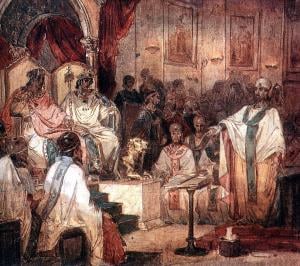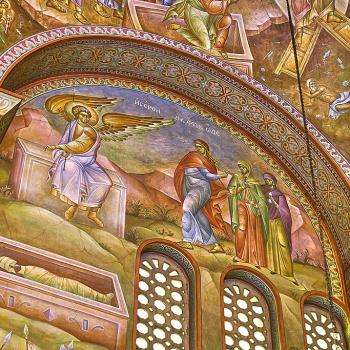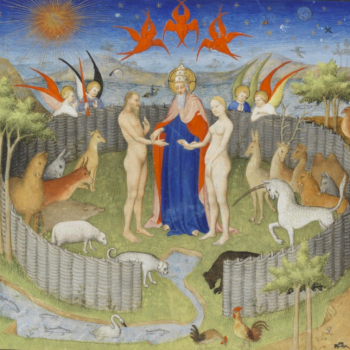
When we commemorate the first six ecumenical councils, councils which were focused especially on the doctrines of the Trinity and the incarnation, we often do so by talking about the “Fathers” of the six ecumenical Councils. This is how the day, as it is celebrated in the Byzantine tradition, is listed on the Byzantine calendar: “Fifth Sunday after Pentecost; Fathers of the first six Ecumenical Councils.” But we must not forget that along with the fathers, the clergy at the council, there were numerous others involved, among them, many important and influential women, women who we should consider designating as the “mothers” of the councils. For example, we should commemorate women like St. Pulcheria, for she was a central figure in the calling forth and promoting the teachings of Ephesus and Chalcedon.
The first six ecumenical councils did not suddenly happen without any reason for them being called; they were called to deal with legitimate struggles Christians had in trying to understand and explain their faith. While we should recognize and acknowledge the work of the Holy Spirit in and through them, work which helped the councils provide authoritative responses to the questions at hand, we must not forget the councils used and embraced explanations which emerged before the calling of the councils themselves, explanations which come out of a human struggle to understand and explain the faith. That is, used, as well as created, conventions which, when understood properly, point to the truth, but when not understood, often bring about confusion. This is why it is important for us, as we celebrate the councils, to look beyond the councils and explore the immediate context from which they came; that way, we will better understand the questions which were being raised and answered, allowing us to know how the vocabulary used to answer the questions was developed, which is necessary if we want to understand the meaning of the answers given at the councils themselves. If we do not do so, we risk misinterpreting the technical vocabulary used by the councils, a problem which we see often happened in history, causing people to speak at cross purposes, leading to more confusion and the need for newer, more refined vocabulary to be established at other councils (as can be seen in the way Chalcedon helped explain the intent behind Ephesus, and III Constantinople explained the intent of Chalcedon).
This is why, when we are commemorating the councils, what happened at them, the teachings they gave us, we should not just highlight the councils, and those who specifically wrote the decrees which became authoritative at them, but all those involved at the councils themselves. For it is often the debates before, and during, the councils themselves, and the way people raised and answered questions, which led to the authoritative solutions given at the councils. We should, moreover, remember the aftermath of the councils, of those who worked to make sure the councils were properly understood, and that orthodoxy remained supported by the Christian populace at large. When we do so, we should keep in mind, it was not just our fathers, but our mothers, women, who helped promote the orthodox cause and made sure the cause came to a proper conclusion at an ecumenical council (or afterward). While Pulcheria is a prime example, she is not the only one. It is hard not to think of St. Helen being behind Constantine and his conversion to the Christian faith, and, therefore, behind the actions he took to help Christians, including the calling of Nicea. And, while we remember the first six councils today, we must not forget how this pattern continued in history, such as seen in the role women had with II Nicea and the defense of icons (such as Irene and Theodora II). Though the women did not have ecclesiastical authority in the councils themselves, it is time to remember their place in Christian history, to know that they often were involved in the discussions and debates which took place before and after the councils, and that it was often women who stood with those who promoted the orthodox faith.
In the Byzantine lectionary, official celebrations of one or more of the ecumenical councils often have with them a reading from the book of Hebrews, a text which tells us to listen to and heed those who came before us, those who have handed down to us the orthodox faith. We are to look up to them and imitate them, not in all things they did, but in the good which they achieved: “Remember your leaders, those who spoke to you the word of God; consider the outcome of their life, and imitate their faith” (Heb. 13:7 RSV). It is the outcome of their lives, not all that they did, which is important, because, of course, if we look the life of any particular person, even someone who died a saint, they often did very unsaintly things (and it was often later in their life they had a change of heart, the kind which led to their sanctification and glorification). We are to learn what they taught, both in word and in deed. We should embrace what we can learn from them, let their teachings and actions influence our lives, so that we can end up living holy lives us well, lives full of love and grace. We certainly shout only only remember the men who came before us, the fathers of old, but also the women, the mothers, for they, often more than the men, have helped preserved the faith and pass it down from generation to generation. The fathers and mothers, both, have a place to be recognized, and so, when we think about the commemoration of the fathers of the six ecumenical councils, let us also recognize the women who stood with them, especially those who helped convene and preserve the teachings of those councils.
Stay in touch! Like A Little Bit of Nothing on Facebook.
If you liked what you read, please consider sharing it with your friends and family!
N.B.: While I read comments to moderate them, I rarely respond to them. If I don’t respond to your comment directly, don’t assume I am unthankful for it. I appreciate it. But I want readers to feel free to ask questions, and hopefully, dialogue with each other. I have shared what I wanted to say, though some responses will get a brief reply by me, or, if I find it interesting and something I can engage fully, as the foundation for another post. I have had many posts inspired or improved upon thanks to my readers.











